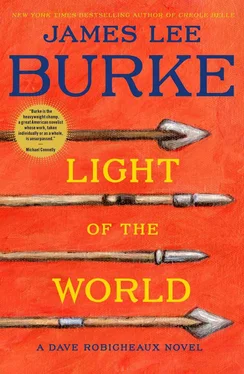“My name is Clete Purcel. I’m a PI from New Orleans,” he said. “I don’t know who you are, but our issue is with Asa Surrette, not anybody else. If you’ve got a piece on you, slide it out here and let me know who you are.”
An odor that was like body grease and moldy towels and unwashed hair and sewage struck Clete’s face with such force that he gagged and had to cover his mouth with his hand.
“Are you a prisoner here?” he asked.
He heard a voice that sounded like someone forming words in his throat without being able to hold the syllables together.
“Who are you, buddy?” Clete said. “Are you hurt?”
There was no answer. Clete eased closer to the doorframe, his .38 lowered, his shoulder and arm pressed flat against the wall. Inside the room, he could hear someone breathing with a clotted hoarseness that made him think of a wounded animal cornered in its lair.
“You heard all that shooting down below,” he said. “That means other people will be here soon, including paramedics. Everything is going to be okay. Come on out, podjo.”
He counted to ten, his throat drying up, his eyes stinging with perspiration. “You want a flash grenade in there? They can really mess up your ears. Come on, bud, this is a pain in the ass for both of us.”
Whoever was in the room was not going to cooperate. Was this how it was going to end, confronting a barricaded suspect, someone he had never seen or against whom he held no grievance? Clete took a breath and gripped the .38 with both hands, his back and massive shoulders pressed tightly against the wall. Showtime, motherfucker, he thought. Then he swung himself into the doorway, his arms stretched straight out in front of him, his snub-nose aimed in the face of a man who had the physical proportions of a steroid addict, whose wide-set eyes and long upper lip were the classic signs of fetal alcohol syndrome, whose cheeks were covered with a soft simian pad of hair, whose mouth was twisted out of shape as though made of rubber.
“Throw it away,” Clete said. “You’ve got no reason to be afraid. We can help you. Surrette has killed lots of people, and he has to pay for it. Guys like you and me are just doing our job. Whatever your problem is, we can fix it. Put down your weapon and back away from it.”
He knew how it was going to play out, no different from a filmstrip that had snapped in half and was spinning out of control on the reel. He saw himself and the impaired man caught forever in a series of black-and-white fragments that Clete would never be able to scrub from his dreams. The impaired man pointed a single-barrel .410 shotgun pistol at Clete’s chest.
Clete began firing, not counting the number of rounds he squeezed off, his ears ringing, the man going straight down on his knees, looking up at Clete. Clete kept pulling the trigger, the cylinder turning, the hammer snapping dryly on spent cartridges, both hands shaking even after his target had slumped sideways on the floor.
Clete hit the light switch. The dead man’s mouth was hanging open, the overhead light shining into it. “Good God,” he said, his stomach turning.
He leaned against the wall, his eyes shut, his head exploding with sound and color, wondering who he was or who he had become and at the lengths he would go in order to stay alive.
Clete came downstairs; his green eyes were the only color in his face. He paused and dumped his spent cartridges in his palm, then clinked them into his coat pocket, as though walking around inside a dream.
“What happened up there?” I said.
“I killed a guy. He had a four-ten pistol,” he replied. “I tried to make him put it down. He was making sounds like he was trying to talk, and I shot him.”
“Who was he?” I said.
“I never saw him before. Dave, his tongue was cut out. I smoked a guy who couldn’t talk. Maybe he was retarded. I don’t know what he was.”
“Slow it down. Are you sure what you saw?”
“You think I could make something like that up? He must be some guy who works for Surrette. Maybe there are more like him on the property, like some kind of cult.”
“You’ve got to keep it together, partner,” I said. “There’s nothing supernatural about Surrette. Psychopaths network.”
But Clete’s mind was obviously concentrated on the image of the man who had died in front of his revolver, and he was not interested in hearing anything I had to say.
“I tried to go down in the basement twice but got kicked back up the stairs,” I said. “Someone is in the corner with a semi-auto and a high-capacity magazine.”
“Where’s Alafair?” he asked.
“Outside with Gretchen.”
“What are they waiting on?”
“I don’t know, Clete. What are they supposed to do? Spray the basement through the window?”
“Maybe the guy upstairs was trying to tell me something. Maybe he didn’t understand what I said to him. I started shooting and couldn’t stop.”
“Listen to me. The program is simple. We get all the innocent people out of here, and we dust the rest. That’s it.”
“I think we blew it. I think this one is coming apart on us.”
“Wrong.”
Either Alafair or Gretchen broke the glass and the taped vinyl leaf bag out of the basement window, sending all of it crashing to the floor.
“I’m going down,” Clete said. “I’m going to take out these fuckers or lose it here.”
And that’s what he did.
I followed him down the steps into the darkness. The air was damp and smelled of burned gunpowder and water that had stagnated in a drain. There was another odor, too, the one I had smelled outside the cave behind Albert’s house. Again and again, even moments ago, I had denied to others the possibility that Asa Surrette was larger than the sum of his parts. His grandiose rhetoric was pirated from the Bible and even from Percy Shelley. His arrogance and narcissism reminded me of Freud’s statement about the practicing alcoholic: “Ah, yes, his highness the child.” Yet I could not explain the fecal stench exuding from his glands; the level of cruelty he imposed on others; the fact that he murdered children in cold blood and felt no remorse; and finally, his ability to recruit others to his cause, convincing them they could profit by the association and walk away from it unscathed.
Nathaniel Hawthorne and Herman Melville and André Schwarz-Bart, the French-Jewish writer who lost his family at Auschwitz, had all asked the same question and never found an answer, or at least one I knew of. Could I expect more of myself? I wanted to forget Surrette and think of Shakespeare’s famous words in The Tempest . How does the passage go? We are such stuff as dreams are made on, and our little life is rounded with a sleep. The poignancy of the line calls up compassion and humility. The words of Surrette suggest a dark complexity that befouls the mind as soon as we try to address it. I think that is where his power came from. We undid ourselves in trying to fathom a mystery that was not a mystery at all.
As I descended into the basement, into its rank odor of sweat and urine and human torment, I realized that the die was cast for all of us, and speculation was of little value in dealing with evil. We try to protect the innocent and punish the wicked and don’t do a very good job of either. Ultimately, we adopt the methods of our adversaries and grease them off the earth and change nothing.
These were the same thoughts I had when I went down a night trail salted with Chinese toe-poppers almost fifty years ago. If my old friend the line sergeant were still alive, I wondered what he would have to say. I suspected he would tell me that the biggest illusion in our lives is the belief that we have control over anything.
Читать дальше












